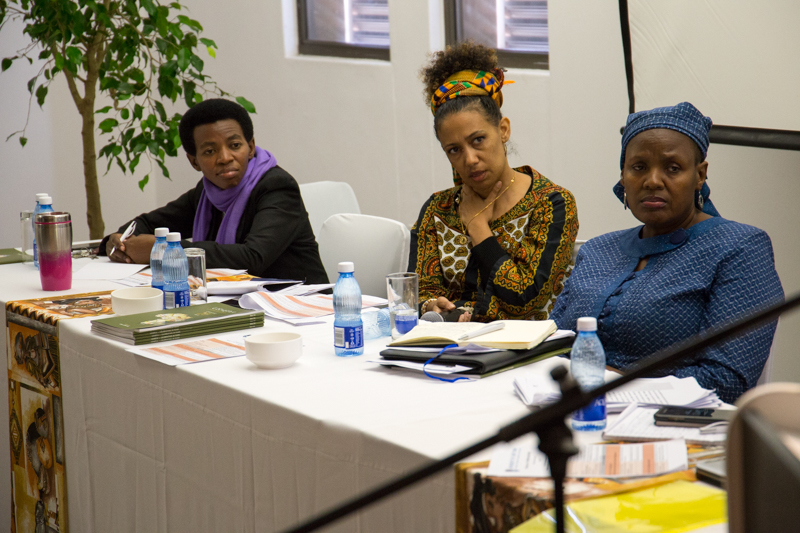Colloquium on Women and Work


The colloquium, championed by Professor Mamokgethi Phakeng, Deputy Vice Chancellor: Research and Internationalisation, was held at the Centre for African Studies on 25 May 2017. The well attended event brought together leading researchers and experts on workplace gender equality, including Kate O’Regan, former Constitutional Court Justice and Judge President Fumane Khabo, President of the Labour Court of Lesotho. This piece was contributed by Dr Sharon Groenmeyer, one of the participating panellists.
Fifteen speakers and five panels contributed towards the success of the Women and Work colloquium hosted by International Academic Programmes Office (IAPO) and Africa Gender Institute (AGI) in partnership with the International Labour Organisation (ILO). The presentations are a contribution towards the Celebrating Africa series publication which has captured deliberations of the ‘Big Debate’ and once again, the IAPO was able to contribute knowledge towards theorising women and work.
Setting the scene, the keynote address by Mwila Banda Chigaga of the (ILO) Regional Office for Africa provided an overview of where women are located in the global world of work. She painted a gloomy picture of how the global economic crisis has affected the position of women in the workplace by pushing women into an informalising workplace. Moreover, she demonstrates that it would take 70 years for the gender gap between men and women to be closed.
However, this pessimistic view was challenged by the other panellists who spoke of how women pushed at boundaries in the workplace to promote decent work. Fumane Khabo, the judge president of the Labour Court in Lesotho spoke of the various cases she handles indicating that discrimination against women continues. Although Lesotho has ratified Convention on the Elimination of all Forms of Discrimination Against Women (CEDAW), employers do not abide by the convention. Nor do employers abide by the UN Family Responsibility Code because women do not receive maternity benefits. Employees challenge employers who do not provide maternity benefits for pregnant women. This case study was contrasted by the role of Rwandan women in post conflict national development. Because of the genocide, women are involved in male-dominated work of agriculture which is the mainstay of the economy.
The three panels that followed considered how informalising work reinforced patriarchy or redefined work for women. Presentations demonstrated how patriarchy appears to be reinforced by not recognising and decriminalising sex work which, like domestic work, is on the continuum of income generation for women because many women are desperately poor and seeking to provide food security for their families, especially their young children. Myrtle Witbooi, General Secretary of the South Africa Domestic Service and Allied Workers Union (SADSAWU) and President of International Domestic Workers Union (IDWF) spoke passionately of how her organisation defends the rights of the most vulnerable workers in society.
Because women often enter poorly paid jobs at the bottom rung of the career ladder they are unable to shift patriarchal relations in the workplace. Insourcing at tertiary institutions reinforced this perspective. Because women have casual contracts as workers or SMME owners they are unable to change the patriarchal relations in the home. Because active labour markets give preference for women in male-dominated jobs, conflict often occurs in the home because men are unemployed but do not take on reproductive tasks of caring for the children or the home while women are at work. The study by Stella Vettori of Unisa, on the domestic and working lives of rural women, highlighted the violence women endure daily.
Being the last speaker at the Colloquium on Women and Work provided an opportunity to reflect on whether Small Micro Medium Enterprises (SMMEs) create equality in the home and in the workplace. Entrepreneurship is the dominant approach for income generation by the South African government who has adopted active labour markets of expanded public works and SMMES. My research study contradicted this viewpoint and raised a number of issues for study of women and work.
Sharon Groemeyer is a sociologist and development worker with more than 20 years’ experience in education and training. Her doctoral thesis was on Women and Social policy in contemporary post-apartheid South Africa with the Norwegian University of Science and Technology, Trondheim in Norway. Until recently, she was a Senior Research Fellow for the Centre for the Study of Democracy (CSD) University of Johannesburg where she researched public participation in local government and published on childcare grants. She has also held a position as Post-Doctoral Fellow in the Faculty of Health, University of Cape Town. She is a member of Codesria and has presented at the Gender Symposium in Cairo, Egypt.
